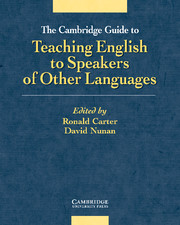Book contents
- Frontmatter
- Contents
- List of figures
- List of abbreviations
- Acknowledgements
- List of contributors
- Introduction
- Chapter 1 Listening
- Chapter 2 Speaking
- Chapter 3 Reading
- Chapter 4 Writing
- Chapter 5 Grammar
- Chapter 6 Vocabulary
- Chapter 7 Discourse
- Chapter 8 Pronunciation
- Chapter 9 Materials development
- Chapter 10 Second language teacher education
- Chapter 11 Psycholinguistics
- Chapter 12 Second language acquisition
- Chapter 13 Bilingualism
- Chapter 14 Sociolinguistics
- Chapter 15 Computer-assisted language learning
- Chapter 16 Observation
- Chapter 17 Classroom interaction
- Chapter 18 English for academic purposes
- Chapter 19 English for specific purposes
- Chapter 20 Assessment
- Chapter 21 Evaluation
- Chapter 22 Syllabus design
- Chapter 23 Language awareness
- Chapter 24 Language learning strategies
- Chapter 25 Task-based language learning
- Chapter 26 Literature in the language classroom
- Chapter 27 Genre
- Chapter 28 Programme management
- Chapter 29 Intercultural communication
- Chapter 30 On-line communication
- Postscript: The ideology of TESOL
- Glossary
- References
- Index
Chapter 23 - Language awareness
Published online by Cambridge University Press: 07 September 2010
- Frontmatter
- Contents
- List of figures
- List of abbreviations
- Acknowledgements
- List of contributors
- Introduction
- Chapter 1 Listening
- Chapter 2 Speaking
- Chapter 3 Reading
- Chapter 4 Writing
- Chapter 5 Grammar
- Chapter 6 Vocabulary
- Chapter 7 Discourse
- Chapter 8 Pronunciation
- Chapter 9 Materials development
- Chapter 10 Second language teacher education
- Chapter 11 Psycholinguistics
- Chapter 12 Second language acquisition
- Chapter 13 Bilingualism
- Chapter 14 Sociolinguistics
- Chapter 15 Computer-assisted language learning
- Chapter 16 Observation
- Chapter 17 Classroom interaction
- Chapter 18 English for academic purposes
- Chapter 19 English for specific purposes
- Chapter 20 Assessment
- Chapter 21 Evaluation
- Chapter 22 Syllabus design
- Chapter 23 Language awareness
- Chapter 24 Language learning strategies
- Chapter 25 Task-based language learning
- Chapter 26 Literature in the language classroom
- Chapter 27 Genre
- Chapter 28 Programme management
- Chapter 29 Intercultural communication
- Chapter 30 On-line communication
- Postscript: The ideology of TESOL
- Glossary
- References
- Index
Summary
Introduction
Language awareness has been conceptualised in several different ways. In a round-table discussion in the UK in 1982 it was defined as ‘a person's sensitivity to and conscious awareness of the nature of language and its role in human life’ (Donmall 1985: 7). Van Lier (1995: xi) defines it similarly as ‘an understanding of the human faculty of language and its role in thinking, learning and social life’. These definitions are quite broad and accommodate various interpretations and practices. In this review I look at the most common ways in which language awareness has been understood in the past, and the ways in which it is currently being interpreted, practised, and promoted.
Background
The concept of language awareness is not new. Van Essen (1997) points to a long tradition in several European countries; see Language Awareness, 1990, 1(1). In van Lier (1996), I refer to the 1930s in the Netherlands, noting distinctions made at the time between ‘language understanding’ (taalbegrip), ‘language feeling’ (taalgevoel) and ‘language insight’ (taalinzicht). Even though grammar translation was dominant in teaching and learning languages up to the 1960s, there have long been strong critiques against prescriptive approaches from applied linguists, including Otto Jespersen, Harold Palmer and Charles Fries (see Howatt 1984). Language awareness proponents have always firmly opposed a view of language learning (both first and second) that focuses on prescriptive instruction and is concerned primarily with correctness, and only secondarily with understanding, appreciation and creative expression.
- Type
- Chapter
- Information
- Publisher: Cambridge University PressPrint publication year: 2001
- 11
- Cited by



